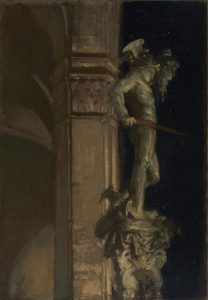John Singer Sargent (1856-1925), Perseus at Night (Statue of Perseus in Florence), 1907
If I should die, think only this of me:
That there’s some corner of a foreign field
That is for ever England. There shall be
In that rich earth a richer dust concealed;
A dust whom England bore, shaped, made aware,
Gave, once, her flowers to love, her ways to roam,
A body of England’s, breathing English air,
Washed by the rivers, blest by suns of home.
Lines 1-8 from The Soldier (1914) by Rupert Brooke
Benito Mussolini WWII speech
Through the late 19th century, Sargent’s fame continued to grow as the recognition for his portraits continued to garner popularity. By 1900, Sargent was at the height of his fame, but it was also at this time when he began to travel more and devote less time to portrait painting. It was known to many that in Italy, Sargent was at home.
Rupert Brooke’s “The Soldier,” as well as the video of Benito Mussolini giving a speech are included to offer different medias in which the nationalistic sentiment began and continued to developed through the beginning of the 20th century. Nationalism has been cited as one of the major causes of the First World War because of its ability in leading European powers to develop a strong belief in its cultural, economic, and military dominance. Various types of cultural expression including music, literature, and theater all contributed to the promotion of nationalism.
Il Piave Mormorava – Italian WW1 Song
Categories: Urbanism and Industrialization, War


